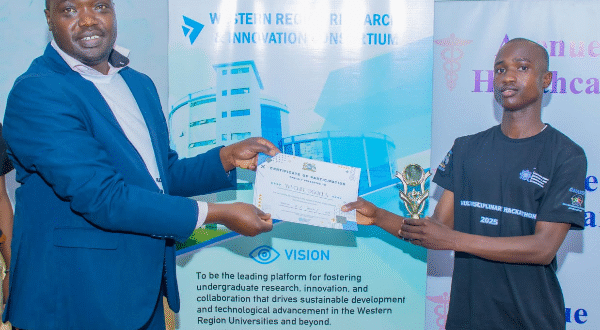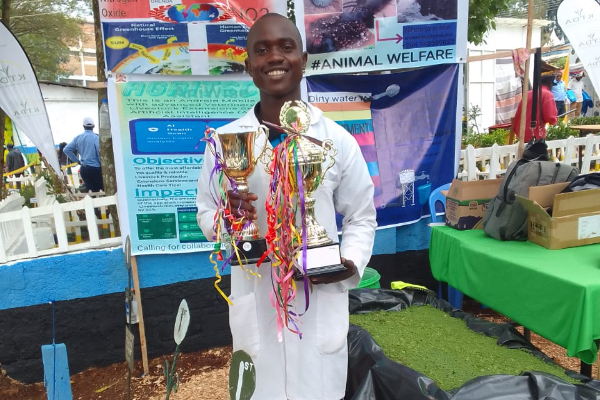Kisii University student develops AI Chatbot App to help famers boost their livestock health
By Sandra Neddy
Agricultural extension and advisory services (EAS) are vital for providing farmers with knowledge, resources, and technologies to improve productivity, yet access remains limited, especially, in far flung areas such as rural settings.
This is in part due to insufficient funds for supporting public extension, lack of appropriate strategies for effective research, and limited coverage of extension services.
Yet, a 2022 study published in Higher Education Press Journals shows that adoption of digitally-enabled EAS using single or a combination of devices can potentially ameliorate the inadequate technical assistance to farmers and provide information to marginalized and hard-to-reach areas.
One young innovator putting this into practice is Polycarp Ochieng Orenda, an Animal Science and Technology student at Kisii University, who has developed an AI chatbot app called Aniwise.
Designed as a digital farm assistant, the Android-based app blends artificial intelligence with practical tools tailored to farmers’ daily needs.
According to Polycarp, Aniwise is deliberately simple, accessible, and even functional offline, making it a more affordable and farmer-friendly alternative to many animal health apps, which are often geared toward veterinarians.
“Aniwise is simple, offline-capable, and speaks the farmer’s language,” he said.
He says early adopters of the app are already recording impressive results by successfully detecting illnesses in their livestock, keeping better farm records, and sharing AI-generated reports with vets for faster intervention.
“One farmer mentioned that AniWise helped him spot a disease early, saving his cow’s life when we collected feedback from our users,” he said.
How the idea came about
The third year student says the idea was fueled by the desire to provide digital, accessible, and affordable solutions to animal welfare which got him to partner with a computer science friend do develop the app and launched it June this year.
“What inspired me mostly is the high cost of accessing even simple professional services by livestock keepers, the worsening of livestock conditions due to delays in accessing professional services and the high advancement of climate change since professionals have to travel to solve even the simplest problems,” he noted.
Challenges faced during development
Developing the app took seven months, from initial research and prototyping to building the AI chatbot and integrating real-time image scanning.
With no external funding, Polycarp and his co-developer invested Ksh83,000 of their own money, forcing them to prioritize essential features.
They also grappled with training the AI to use simple language, adding offline functionality, and winning farmers’ trust.
Despite limited government support, their persistence has paid off: the app is now functional, welcomed by farmers, and providing them with opportunities to earn through innovation competitions and related events.

The features of the app
Aniwise has several smart features that are farmer-friendly. “It is a mobile app that is defined by a farmer for farmers,” highlighted Polycarp.
First, it has an AI chatbot specifically trained on farm and animal data. Farmers can interact with an AI-powered chatbot which uses simple and conversational language instead of technical jargon which is sometimes hard for a normal farmer to understand.
Additionally, the app has an animal image scanning and analysis feature that works in real-time. This means that farmers can take a photo of their animal and it instantly scans the image for any signs of disease or abnormalities. Nevertheless, it does not stop at just giving results.
Farmers are asked follow-up questions about the animal symptoms and their feeding behavior to enable the app refine its analysis. It then generates a diagnosis report which can be saved as a PDF document which can be shared with a vet for further consultation.
The app also has a record-keeping feature. This helps farmers to store digital records of animal health, production, feeding schedules, and treatments. Therefore, they can easily track everything in one place.
The app’s AI can also review these records to show trends such as drops in milk production, recurring illnesses or weight changes. These are some trends that farmers tend to miss easily. Furthermore, farmers can still access the app’s offline educational library in areas where there is poor internet connectivity.
The library provides tutorials, guides, and motivational content to support farmers in their day-to-day farm activities.
According to Polycarp, they measure the app’s impact using the Number of active users, the records logged, the diagnoses performed and the feedback or testimonials on improved animal health outcomes.
Future Plans for the App
Polycarp revealed that upcoming features will include veterinary teleconsultations, multilingual support, an analytics dashboard, and even a marketplace for farm supplies.
“In the next 3–5 years, I see Aniwise becoming the leading digital livestock care and farm management platform across Africa,” he said.
The team also plans to partner with governments, NGOs, and veterinary boards. “Long term, Aniwise should stand as both a farmer’s personal assistant and a central hub for agricultural data that improves animal welfare on a large scale,” said the 21 years old young innovator.
How he connects with farmers
Polycarp actively engages farmers and tries to reach them where they are. He uses local farming groups on social media and a WhatsApp channel to share updates, demonstrate how the app functions, and answer questions directly.
For farmers who are ready to get started, Aniwise is available for download on the Google Play Store. This makes it easy to be accessed with just a smartphone.
Advice to fellow youth
Polycarp urges young people interested in agri-tech to pursue solutions that are practical, affordable, reliable, eco-friendly, and centered on improving animal welfare.
“Start by focusing on real farmer problems, not just flashy technology. Agriculture is practical if your solution doesn’t fit into a farmer’s daily routine, it won’t survive,” he said, “be patient, because progress in agri-tech takes time, and don’t be afraid to start small with limited resources,” he added.




Comments are closed.